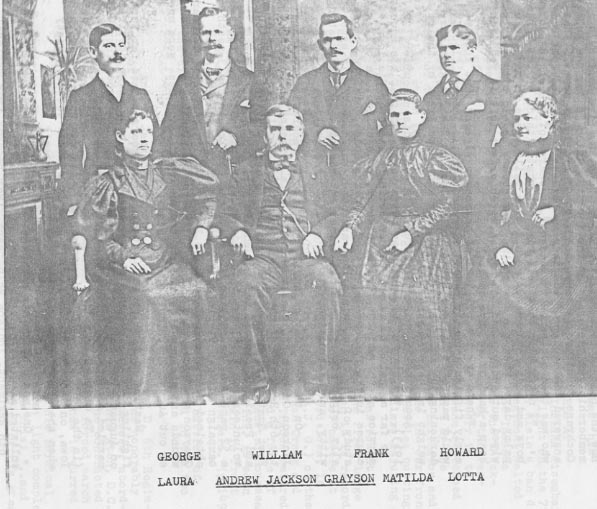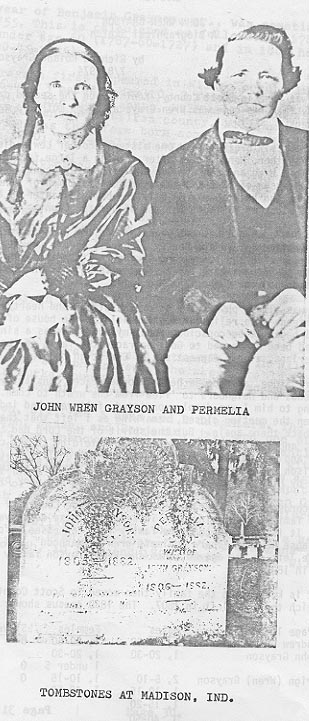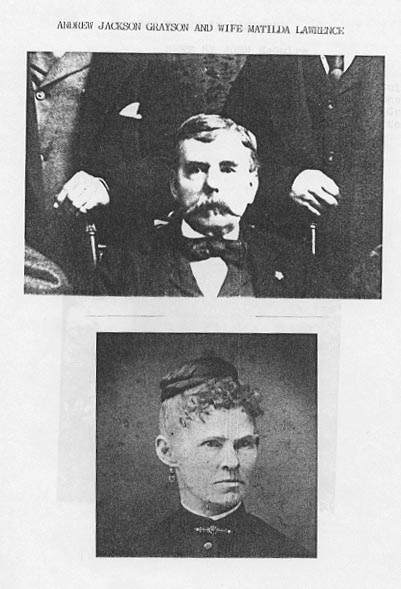
ANDREW JACKSON GRAYSON
a biography
by Richard Roland Grayson, M.D.
Written 1975

My great grandfather, Andrew Jackson Grayson by all accounts from those who knew him, was a remarkable man. In order that his achievements not be forgotten by his descendants and in recognition of the fond memories of him by those yet alive who remember him, it seems appropriate to commit to paper a brief story of his life.
John Wren Grayson and his wife Permelia (nee Cummins) had lived in Indiana only 8 years and had been married 9 years when their 5th child, Andrew Jackson Grayson was born. The place was the family farm near Westport in Decatur county, Sandcreek township. The whole Grayson clan was in Decatur county at the time, and included about 7 other families. Andrew was born the day after Christmas; December 26, 1838. (As I write this, the 137th anniversary of his birth approaches.)

When Andrew was born, he had 3 older sisters and a brother: they were Rebecca, age 8; Sarah, 6; Mary, 4; and Salathiel, 1. The other brother, John Wren Grayson, jr. was born in 1842, making a neat family package of 3 boys and 3 girls.
When Andrew was 3, the family sold the farm and moved 60 miles south to Madison, Ind.
Some anecdotes from his youth still are with us: between 1881 and 1900 Andrew published many stories in the Madison Courier and the Madison Herald. These stories were collected and are on file at the Indiana State library in Indianapolis. Below are reprinted some selected paragraphs from these stories to give us an idea of Andrew's childhood and adolescence:
"The old Third street cemetery, now John Paul Park, was originally much larger, reaching across what is now Third street. The city in opening up the street cut off a part of the cemetery and the south side and never removed the bones of all the departed. Among those now lying about the center of the street, or on the south side, are the bones of "White" who was shot and killed by "Sheets" near Poplar Lane and Second streets. In 1846-1849, when father lived across the street from the old cemetery, the youngsters would try to locate the spot where different ones, that were not removed, were still lying.
"I used to be afraid of dead ones, like all children. All such foolishness vanished as I grew old. Never fear the dead ones, but always be on the alert and keep an eye on those rascally live ones."
"In 1849, when I was but 11 years of age, my father was employed as a cupalo tender in the old Lewis and Crawford Foundry. When Western Fire Co. was organized and received its charter from the State of Indiana in 1850, the company's first engine house was a frame carriage house in the rear of Samuel Crawford's residence, now the home of Hon. Manly D. Wilson, and the fire company's membership was employees at the foundry, which is now the McKim-Cochrane furniture factory. Among other prominent members that answered to the tap of the foundry bell were.....and John Grayson, who was then acting as "messenger" in charge of the engine house...
"I never hear that bell ring but what I think of the Whedon boys and Andy McManaman, the old time railroaders in Madison's palmy days. When the new regime came about, the old time ways were wiped out and you had to carry a watch or get left if you didn't keep a hand or an eye on it."
"Where are the billions of passenger pigeons that in the early fifties annually passed over Madison?...Immense flocks would pass over Madison like a rain-cloud in their migrations, darkening the sun for hours, and breaking down trees by their weight in their roosting places."
According to Andrew's obituary in the Madison courier (22 July 1913), "he started to work when quite young, so that his education so far as going to school was exceedingly limited. His long service at the printing trade, however, ...equaled...a collegiate course in the fundamental branches of knowledge, history, close study of the bible, historical and other works, with his exceptionally bright memory, made him a most entertaining and interesting, witty, and instructive writer."
On the 20th day of April, 1861, it is recorded that Andrew Jackson Grayson officially enlisted as a Sergeant in Company E of the 6th Regiment of the Indiana Volunteers. It is notable that Fort Sumter had been fired upon only 8 days earlier, April the 12th, and President Lincoln had issued his call for 75,000 3-month volunteers on April the 15th. Andrew later (perhaps 1864) published a 52 page book recounting in detail his service in the 3-month campaign in West Virginia. A photocopy of this book has been obtained from the Indiana State library at Indianapolis. Sergeant Grayson saw much action in that campaign and luckily escaped wounds and sickness. He and his company of Madison men were mustered out August 2nd, 1861. Andrew was 22 years old.
Wasting no time before Company E was reorganized for further fighting, Andrew applied for and was issued a marriage certificate on August 13th, 1861, for marriage to Matilda Lawrence. They were married August 18th following. Matilda was 18 years old.
To digress regarding Matilda Lawrence: according to her obituary (in the July 29, 1899 Madison Courier), she was born in Burlington, Iowa, on January 16, 1843. "Her parents removed to this county when she was 8 years old. One month after his marriage, on 20 September, 1861, Andrew enlisted as a Sergeant in E company and as Lieutenant in D company 6th Regiment, Indiana Volunteers. (War records from National Archives, Washington, D.C.) Prior to his mustering in, the record shows that he "joined for duty and enrolled Aug. 26th, 1861, in North Madison." Nothing is known about his next 6 or 7 months of military service but one article written by him concerning his memories of the battle of Shiloh. The story is taken from the Madison Courier of May 9, 1883. It is signed by "Phelix Adair", which was his frequent pen-name.
'THE OLD MADISON BAND. HOW THEY FOUGHT THE REBELS AT SHILOH WITH "YANKEE DOODLE". ... When the 6th Indiana disembarked from the steamer Hill at Pittsburg Landing at daylight on the 7th of April, 1862 and moved up to the top of the bluff, Klein's band was in the lead playing Yankee Doodle Dandy. The regiment halted long enough for Col. Crittenden to tell the boys what Indiana expected of them, when "forward" came again and into the thickest of the fray marched the band, still at the head of the regiment, all the while firing their Yankee Doodle battery into the rebel's ears while the notes of the grand old tune re-echoed across the Tennessee River, only drowned for a moment by the roar of the eleven-inch guns on board the gun boats Lexington and Tyler, which kept up a constant shelling of the woods in our front and to do this had to fire over our heads, the projectiles cutting off the limbs of the trees, which fell upon our soldiers injuring a great many.... "
The battle of Shiloh, or Pittsburgh Landing, was fought on Sunday and Monday, April 6 and 7, 1862. It was the first large conflict of the Civil War. In the book Ohio at Shiloh it is recorded that the Fourth Brigade (Rousseau's) formed in line of battle at 8 a.m., April 7, 1862, in front of the camp of the 3rd Iowa, in the following order: the 6th Indiana (in which was A.J.G.) on the left...at 9 a.m. the brigade advanced across Tilghman Creek and engaged Trabue's Brigade until about 11 a.m., when Trabue retired and Rousseau advanced to Woolf field, where he found a force of the enemy on the west side. His ammunition being exhausted Rousseau retired and Kirk's Brigade took his place in first line. As soon as ammunition was supplied Rousseau took position again in front line and engaged the enemy until he retired from the field. "(p. 149-150.)
The battle of Shiloh was one of the bloodiest battles of the Civil War; over 20,000 men were killed or wounded in two days fight.
Andrew Jackson Grayson, Lieutenant in company D, 6th Regiment of the Indiana Infantry, age 22, resigned and was honorably discharged on May 22, 1862 at Pittsburgh Landing, Tennessee, according to his war records in the National Archives, Washington, D.C. In a pension application in 1884 he stated that "he contracted varicose veins of the left leg while on a seven days forced march to join General Grant at Pittsburgh Landing," and thus incurred disability.
At the time of the above declaration in 1884, his physical description was listed as : Height, 5 feet 8-9 inches; light complexion; dark hair, hazel eyes. In the 1910 biography is this: "..and his dome of thought requires a No. 72 hat .... evidence of his great mental capacity." Following the Battle of Shiloh, Andrew returned to Madison where he returned to work at the Madison Courier Newspaper. He worked at the newspaper for over a half a century all told, "filling all positions from devil to foreman, and doing his work well." (Ref.: his obit.)
In 1864, he published a series of sketches of the 6th Indiana regiment in West Virginia, the last of which appeared in the Dec. 3rd issue, 1864, of the Madison Daily Courier. Following this, he "revised, rearranged, and put the entire work in book form". He was foreman of the Courier office at the time. "These articles have been eagerly sought for and read with a remarkable degree of interest by the public"...according to an account in the Courier at the time..."Jack has the happy faculty of taking us with him, and we see everything that occurred as plainly as if we were actually living the whole thing over again. We are glad to learn that Mr. Grayson contemplates putting it in book form, and if he does so, we hope that every citizen of Jefferson county will secure a copy, as it will be put at a mere nominal sum, in the reach of all.
There are 4 items of his writing in the Indiana State Library; they are : 1. Jennie Lind at Madison in 1851; 2. The Boy Surgeon, a Military Character Sketch; 3. The Spirit of 1861. History of the 6th Indiana Regiment in the Three Month's Campaign in Western Virginia; 4. Collection of about 40 articles he wrote for the 2 newspapers in Madison from 1881-1900.
Less than a month after Andrew was discharged from service, he and Matilda had their first child; Laura H. Grayson was born June 13, 1862.
Five other children were born to the couple; they are listed, in Andrew's own handwriting on a pension application dated May 4, 1989: William M. Grayson, July 22, 1865; Frank E. Grayson, June 8, 1868; George E. Grayson, August 5, 1871; Lotta B. Grayson, March 25, 1874; and Howard Grayson, October 15, 1877.
In the 1879 Madison business directory were listed 5 Graysons:
1. Andrew J. Grayson, foreman News Room Courier, res n s 3rd w Depot
2. Charles M. Grayson printer Courier (eldest son of Salathiel)
3. John Grayson supt Springdale Cemetery (Andrew's father)
4. John W. Grayson asst supt Cemetery (Andrew's brother)
5. Salathiel Grayson, compos & correspondent Courier (Andrew's brother)
The Grayson family seems to have been almost all in the printing trade, although Andrew was part journalist; in the 1887-8 Madison City Directory were listed 14 Graysons, of whom 6 were printers. These were 1. Andrew, 2. his son Frank, 3. his son George, 4. his brother John W., 5. his brother Salathiel, and 6. his son William. All 3 sons and Andrew were listed as living at 724 W. Third Street. "Besides being an A No. 1 printer", according to an article about him in the Madison Herald in 1910, he was a member of Western Fire Company, senior member of the Madison Lodge of Odd Fellows. President of No 8 Building Association, and served for several years as Justice of the Peace.
Edna Freese, one of his son William's daughters, remembers Andrew telling her of officiating at weddings as a Justice of the Peace, and singing "My Old Kentucky Home" for the wedding parties.
Mabel Burkhart, a sister of Edna's says that "Grandpa Andrew Jackson Grayson was a squire on the Ferry boat that went from Madison to Kentucky and he married couples on the boat, mostly runaways and eloping. He used to tell us funny stories about it all." According to Webster's dictionary, one definition of "squire" is: ' a title of respect commonly applied to a justice of the peace or similar local dignitary, as in a rural district.'
The 1910 Herald article foes on: "In addition to this varied career, when a young man he made two or three trips to New Orleans on flatboats, before the era of fast steamboats and trains and describing these dangerous, yet fascinating trips to the young men of those days, we have heard him facetiously epitomize them as walking from Madison to New Orleans with a big log of wood on your shoulder, referring to the fact that the crew would have to work at the oars of the flatboat and make the long sweeps by walking hour after hour, in order to make the trip in as quick time as possible."

Matilda Grayson, his wife, died at age 56 on July 28, 1899. The Courier devoted almost a full column to her obituary the following day. Besides her children she left 2 sisters and 1 brother: Mrs. John Pollock of Battle Creek, Mich., and Mrs. Thomas McNutt, near Wirt in Jefferson County, Ind. The brother, Oliver Lawrence, lived in Dayton, Ohio. She "was of a lovely and lovable disposition, devoted to home and fireside." ... She was a member of Trinity M.E. Church. Her 4 sons and 2 sons-in-law served as pall bearers. "She was the center of a beautiful homelife which she created and held together. She lived to realize the brightest and best reward that can come to womanhood---the satisfaction of seeing her family grown to maturity, filling honorable stations in life, respected and useful."
Ward M. Jones, son of Andrew's daughter Lottie Jones and her husband John Jones, remembers that his family moved to Kansas City, Mo. from Indianapolis about 1906 when Ward was 5, and lived at 3300 Wampool Avenue. He says that Lotta invited her father to live with them because he was getting old, so Andrew moved in with them and lived there till about 1910, when he moved back to Madison and stayed with his son George.
Shortly after, he moved to Franklin, Ind., to live with his son William, where Will's daughters Faye, Edna, Esther, and Mabel learned to know him. Esther recalls, "everyone who knew him loved him and they called him Jack. I was 13 when he died...he lived with us; he kept very little of his pension money for himself. Sent it to old friends who were in need, whom he kept in touch with and who were in the army under him. He used a cane for walking and made 2 trips a day, about a mile, to town and would sit on the ledge at the courthouse. I had to pass it coming home from school and I'd say, come on Grandpa, let's go home...and he'd say, is that you Esther? It's not 12 yet. Then the clock would strike and he would take out his watch and say, Right on the dot."
Edna Freese recalls, "Grandpa Grayson said the Graysons came from Ireland and the Lawrences from Scotland. "She has no idea why he said that, "but that is what he always said."
Mabel said that Grandpa "also told us all about the war. He had his suit and American flag all folded in a suitcase and my, so proud of them. He used to say he was only here on a visit as Heaven was his home, and point up to the sky with his cane."
Andrew Jackson Grayson died at the age of 75 at the home of his son William in Franklin, Ind., July 22, 1913. In one of his obituaries is recorded, "Dear old Jack; his lips are dumb, but his spirit will linger long in the hearts of those who knew and loved him, and will ever bring memories, sweet with hours and days of good cheer and joy, He never searched for the unpleasant things in life, nor recalled sad and sorrowful hours of man's existence. His motto was that of the sun dial; he recorded only the days of sunshine. His friends were legions and their faces that were once wreathed in smiles at the mention of his name were tinged with sorrow and regret when told of his death.
"It may be that his life was not a success as the world views it, for he filled not his coffers with silver and gold to be cast on the threshold of eternity, nor strove for power that passes away like perfume of early dawn; he built no monument of brick and mortar to perpetuate his name, as if to mock the living God, but leaves an inheritance rich with good humor and full of sunshine which neither summer's sun nor winter's blast can decay."
-30-